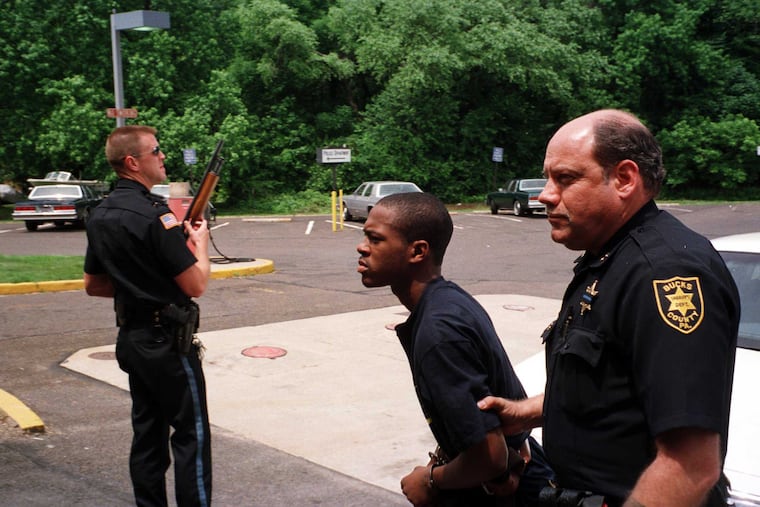A man who killed four people in Bucks County as a teen is fighting to have his life sentences overturned
Ivory King's 1998 sentencing for shooting four people at a crowded Bristol Township house party is up for review due to a Supreme Court ruling.

In nearly eight hours of testimony on Friday, the wounds of a nearly 30-year-old quadruple murder were laid bare in a Bucks County courtroom.
Common Pleas Court Judge Rea Boylan heard dueling arguments over the fate of Ivory King, whose four consecutive life sentences are up for review under a change in federal law.
Prosecutors, led by Bucks County District Attorney Matt Weintraub, presented evidence in support of their contention that King should remain incarcerated. King’s attorney, Caroline Heller, called upon expert witnesses and corrections staff who described King as a model prisoner who is truly remorseful for his actions.
After a full day of testimony, including a statement from King himself, Boylan is expected to make her ruling Monday morning.
King, 41, was convicted of four counts of first-degree murder in 1998 for the deaths of Jackie Wilson, 27; SaPhil “Phil’' Taylor, 19; Milika Brinson, 22; and Anthony Jackson, 37. A fifth victim, Lahkeisha Monroe, was shot in the head but survived, prosecutors said.
In May 1998, King, then 17, brought a gun to a Memorial Day party in Bristol Township and opened fire into a crowded apartment while searching for a man prosecutors described as a rival drug dealer. The victims all appeared to be bystanders caught in the crossfire, authorities said.
Prosecutors pushed for the death penalty at the time, saying it was warranted by the callousness of the crime. But Bucks County Court Judge Kenneth G. Biehn decided against it, and sentenced King to four consecutive life terms in prison.
A 2016 Supreme Court decision retroactively banned such sentences for juveniles, calling them inhumane and setting the stage for King’s case to be reexamined.
On the night of the shooting, prosecutors said, King and two other men drove around Bristol Township, searching for their target. After visiting two other Memorial Day parties, they found him at an apartment in the Venice Ashby housing projects.
There, King got out of the car and spotted Jackson standing near a shrub, and shot him first, prosecutors said. He then shot Wilson as she was leaving the home through its front door. Inside, he gunned down Taylor as he tried to flee upstairs, and then fired a fourth time through a window, striking Brinson and Monroe.
Later, witnesses in King’s native Camden said he boasted about the killings, laughing at news reports about the deaths, according to prosecutors. He threatened to kill a Bristol Township detective investigating the case if he ever tried to arrest him.
And when one of the witnesses asked about Brinson, whom King was dating at the time, he allegedly scoffed and said, “She was at the wrong place at the wrong time.”
During Friday’s hearing, King made a brief statement in his own defense, apologizing for the shooting and telling Boylan he is no longer the person he was nearly three decades ago. He has said the shooting was an accident, and that he didn’t mean to kill the four victims.
“What happened that night shouldn’t have happened. They didn’t deserve to have their lives taken away,” King said. “I wish I could go back and change things, but I can’t, and I have to live with that.”
But the victims’ surviving relatives who gathered in Boylan’s courtroom Friday urged her not to let King see freedom.
Through tears, and often with the support of loved ones standing at their sides, they described how the violence wrought by King had torn their families apart and robbed them of a lifetime of memories. The victims never got to see their children grow and never got to meet their grandchildren, and in some cases, great-grandchildren.
Many expressed outrage at the idea that King could be set free.
“King took everything from me,” Brinson’s daughter, Kyasia Blaine, wrote in a statement read by a relative. “I am broken. I try every day to heal my heart from that one day I will never forget.
“I don’t want him out,” she wrote. “He is a menace to society.”
Jackson’s eldest daughter, Tanya, said she visited King in prison in 2010, seeking to learn more about the shooting. She forgave him, she told Boylan, because of the values her father taught her as a child.
“The forgiveness I gave to the defendant was sincere,” she said. “But my siblings and I were given a life sentence and it just doesn’t seem fair that the defendant would get any different.”
Meanwhile, corrections officials described King as a trustworthy, dependable prisoner who served as mentor to younger inmates during group therapy sessions.
One said King had exhausted all of the rehabilitative options that are available to inmates, and that keeping him behind bars wouldn’t be a service to him or the community.